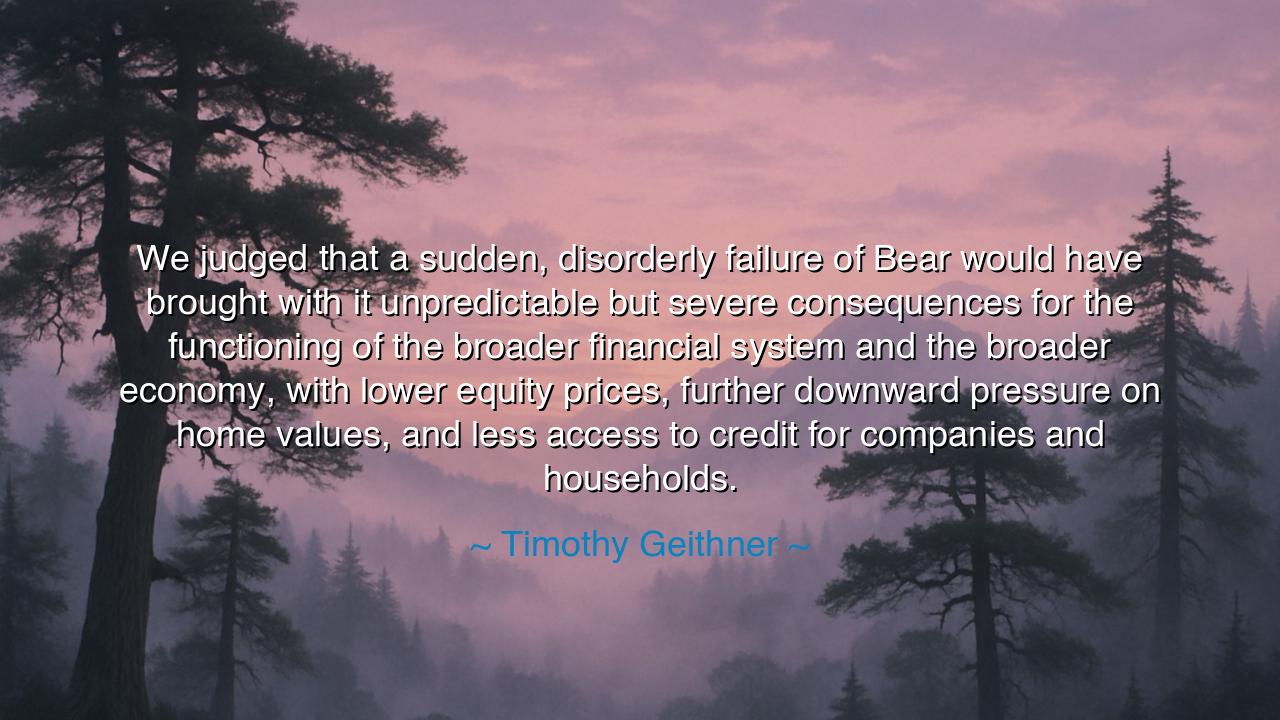
We judged that a sudden, disorderly failure of Bear would have
We judged that a sudden, disorderly failure of Bear would have brought with it unpredictable but severe consequences for the functioning of the broader financial system and the broader economy, with lower equity prices, further downward pressure on home values, and less access to credit for companies and households.






Host: The living room was quiet, with only the soft sound of a ticking clock filling the space. Outside, the world seemed to slow down as the evening settled in. Inside, Jack sat on the couch, his eyes focused on a report in front of him, while Jeeny sat nearby, a notebook in her lap, her gaze on him, sensing the depth of his thoughts.
Jeeny: (breaking the silence, her voice thoughtful) “You know, Timothy Geithner once said, ‘We judged that a sudden, disorderly failure of Bear would have brought with it unpredictable but severe consequences for the functioning of the broader financial system and the broader economy, with lower equity prices, further downward pressure on home values, and less access to credit for companies and households.’”
(She paused, her voice calm but filled with curiosity.) “What do you think he meant by that? About the consequences of Bear’s failure and the ripple effect it could have had on the economy?”
Jack: (pausing, his voice reflective as he considered the words) “I think Geithner is talking about the interconnectedness of financial systems. Bear Stearns wasn’t just a single company. It was part of a larger web of financial institutions, and if it had failed suddenly and without order, it could have caused a domino effect. The ripple effect would have been felt far beyond Bear’s collapse — it could have triggered a financial crisis, affecting everything from equity prices to home values to access to credit.”
Jeeny: (nodding slowly, her voice steady with understanding) “Exactly. The problem with the sudden failure of a major financial institution isn’t just the loss of that one company. It’s that everything is connected. If one piece of the system falls apart unexpectedly, it puts pressure on the rest of the system. We saw that during the 2008 financial crisis — how a failure in one part of the economy can send shockwaves through the entire financial system, leading to lower trust, lower values, and less liquidity.”
Jack: (smiling faintly, his tone lightening a bit) “It’s almost like the financial system is a giant house of cards. If one piece collapses, it can bring everything else down with it. That’s why managing financial institutions and their risk is so crucial. A sudden, disorderly failure can be catastrophic, because of the impact it has on the broader economy.”
Jeeny: (gently, her voice full of empathy) “Yes, and Geithner’s point is that, while Bear Stearns was struggling, its sudden collapse would have created even more chaos than if it had been managed carefully. It wasn’t just about saving Bear Stearns; it was about protecting the stability of the entire financial system. If too many pieces of the system fall at once, the consequences are far more severe.”
Jack: (nodding thoughtfully, his voice calm) “It’s like a balance, isn’t it? On one hand, you don’t want to prop up failing institutions indefinitely, but on the other hand, you can’t let them fall without a plan. The idea is to avoid the domino effect, to keep the system stable while still addressing the root causes of the problem.”
Jeeny: (smiling softly, her voice full of understanding) “Exactly. Stability is the goal — both in the financial system and in the economy as a whole. Geithner was warning that if the system isn’t carefully managed, we risk something far worse than the initial problem. It’s about keeping everything connected and ensuring that when a crisis arises, it’s handled in a way that mitigates the damage.”
Host: The room felt quieter now, the weight of Geithner’s words lingering in the air like a sobering reminder of how fragile financial systems can be. The idea that one failure could lead to widespread disruption wasn’t just a theoretical risk — it was a reality that had been felt deeply during the 2008 crisis. Jack and Jeeny both understood that managing risks, maintaining stability, and preventing disorderly collapses were key to preserving the health of the broader financial system.
Jack: (softly, with a sense of clarity) “I think that’s the real challenge, isn’t it? It’s not just about avoiding failure; it’s about managing failure in a way that doesn’t destabilize everything else.”
Jeeny: (nodding, her voice calm but assured) “Yes, it’s about maintaining balance. Knowing when to step in and when to let the system adjust, but always with the goal of protecting the broader economy and people’s access to resources.”
Host: The night outside had settled in fully, and inside, there was a quiet understanding of the complexity of financial systems and the importance of stability. Geithner’s words had reminded them of the delicate balance required to maintain that stability — the need to manage risk and prevent the domino effect of failure. It was a lesson in both caution and responsibility, one that transcended the financial world and resonated in many aspects of life.






AAdministratorAdministrator
Welcome, honored guests. Please leave a comment, we will respond soon